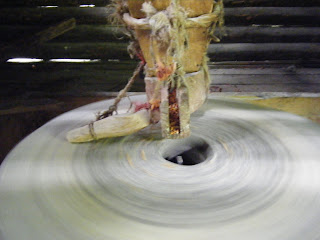




Here I am back in Kunming for a few days before my last foray out into the field, Liangshan in Sichuan, to check out villages. Before I left Kunming the last time, I moved in with a professor at Yunnan University named Peng Laoshi who wants to improve her English. Her twin sons are both abroad in college, one in Thailand and one in Norfolk VA and I'm sleeping in their room. It's a nice place, much nicer than my apt with the folks from IGERT, and I have a nice desk with a view, internet, and my own bathroom with heat lamps. Pretty sweet.
Except for last night when Peng laoshi invited a few friends over to "drink tea," which is a much bigger deal than it sounds. She's got a traditional tea setup, with the carved wooden table and tea-specific implements and tiny cups that are filled over and over again, each thimbleful a different expression of the fine aged black tea we are drinking. She assures me it's like wine,and I guess if you have the nose for it, it could be true. But I've had a cold the past few days and was coughing and sneezing a lot into my tea, which detracted from experience. Well tea was just the beginning and it turned out that the friend who had come over with her 18 year old daughter was Penglaoshi's personal Chinese doctor, practiced in the arts of acupressure, acupuncture, cupping, and what I can only describe as scraping. The scraping consists of lotioning up your skin and then well, scraping a blunt blade (in this case made of cow horn) across the skin over and over. The skin gets red and then purple, and it's supposed to release toxins but it just looked painful. Thankfully, I was not asked to participate.
I did get cupped. The traditional way uses glass bells that are swabbed inside with alcohol, set aflame, and pressed into the skin. As the fire consumes the oxygen in the bell it creates a vacuum that works like a glass suction cup on your skin. A hickey machine, to this crass American. The easier, "modernized" method uses a metal bell with a rubber gasket, and you create a vacuum by turning a built-in screw. The ahem doctor was afraid to hurt me, but Peng Laoshi is pretty hardcore and kept saying to her, don't be scared! So I ended up with two big round purple hickeys on either side of my neck. Today it feels like a sunburn.
That would have been fine if I hadn't insisted on watching Peng Laoshi's back puff out under the glass bell and turn purple and splotchy. It was really gross looking. I have a notoriously delicate sensibility, actually, and suddenly I felt the old familiar feeling of the walls closing in. I stood up quickly, because it would be just too embarrassing to keel over onto the tea table, and strode into the living room to pass out briefly on the floor. Nobody saw, and I pulled myself onto the sofa and laid there, waiting for the room to stop spinning. Soon enough Peng Laoshi emerged from the tea room to show off a series of purplish circles orbiting her spine.
Resting? She asks me.
Yeah. I'm not used to this.
I should say, Peng Laoshi is pretty awesome and it's been fun living with her, even for just a few days. We met because she is an expert on minority, particularly Yi, culture. The Yi have a long history of living in the mountains and growing buckwheat, and when we met several weeks ago, she gave me a short primer on the history and customs of the group. At almost 5 million people and several "Yi autonomous prefectures" in Yunnan, they far outnumber Tibetans and every other minority here, with but somehow their press is not as good. Peng Laoshi is also very into everything traditional and Chinese, and loves to talk and share, which has been really interesting for me. Sadly, I don't think I've helped her much with English.
















































